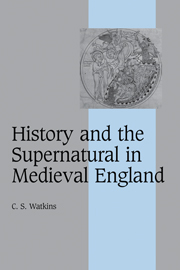Book contents
- Frontmatter
- Contents
- Preface
- Note on the text
- List of abbreviations
- INTRODUCTION
- Chapter 1 THINKING ABOUT THE SUPERNATURAL
- Chapter 2 INVENTING PAGANS
- Chapter 3 PRAYERS, SPELLS AND SAINTS
- Chapter 4 SPECIAL POWERS AND MAGICAL ARTS
- Chapter 5 IMAGINING THE DEAD
- Chapter 6 THINKING WITH THE SUPERNATURAL
- CONCLUSION
- Bibliography
- Index
- Cambridge Studies in Medieval Life and Thought Fourth Series
Chapter 2 - INVENTING PAGANS
Published online by Cambridge University Press: 23 June 2009
- Frontmatter
- Contents
- Preface
- Note on the text
- List of abbreviations
- INTRODUCTION
- Chapter 1 THINKING ABOUT THE SUPERNATURAL
- Chapter 2 INVENTING PAGANS
- Chapter 3 PRAYERS, SPELLS AND SAINTS
- Chapter 4 SPECIAL POWERS AND MAGICAL ARTS
- Chapter 5 IMAGINING THE DEAD
- Chapter 6 THINKING WITH THE SUPERNATURAL
- CONCLUSION
- Bibliography
- Index
- Cambridge Studies in Medieval Life and Thought Fourth Series
Summary
The existence of stories about the ambiguous supernatural prompts inevitable questions about the cultures which generated them and the possibility that beneath the surface of shared Christian rituals there existed depths of belief which were not fully Christian, embedded in cosmologies which preserved vestiges of paganism. Yet such arguments for ‘pagan survivals’ seem in many ways very problematic for the ambiguous beings we met in the previous chapter had been readily admitted into a Christian framework by clerical writers who were sensitised to error and heathenism. For churchmen to report these beliefs without recognising their connotations would demand a degree of interchange between local and clerical communities great enough to transmit the stories and yet a cultural discontinuity sharp enough to make the clerical writer blind to their implications. Layamon evoked the vanished pagan past populated by a muddle of gods from Woden to Mercury and Frea to Diana, whose knowledge of the future might be solicited by pouring milk into the temple fire. That these were all faces of the devil, the parish priest of Worcester was in no doubt, but he was far less scathing, as we have seen, about the elves and even the incubi. So ‘survivalist’ theses built on stories about such ambiguous beings would be on rather shaky foundations. And yet there is a small body of stronger evidence for pockets of pagan cult in the localities – ‘heathen’ practices which a handful of churchmen writing in the twelfth and thirteenth centuries explicitly denounced.
- Type
- Chapter
- Information
- History and the Supernatural in Medieval England , pp. 68 - 106Publisher: Cambridge University PressPrint publication year: 2007



